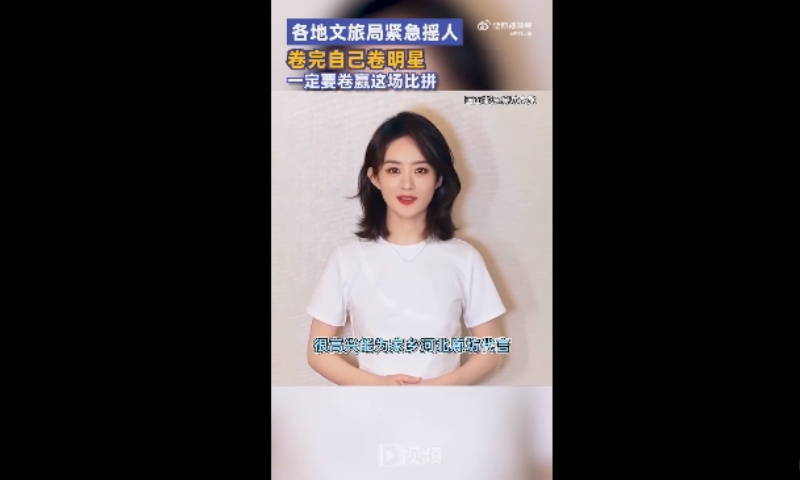Regional govts use celebrities' power to boost cultural tourism

Including inviting Chinese superstars like Xiao Zhan and Wang Yibo to introduce their hometowns, a cutthroat competition has seemingly recently started among several culture and tourism bureaus across the country, which are tactfully transforming "star power" into a new advertising mechanism for provinces and cities to boost local tourism.
The competition is currently white-hot. So far, provinces like Hubei, Shandong, Hebei and Jilin have all found tourist ambassadors like actors Zhu Yilong and Huang Xiaoming. Take Wang Yibo's home province of Henan as an example. Its provincial-level bureau of cultural tourism has been posting around 20 to 30 promotional videos per day on sites like Sina Weibo since January 10. Hebei Province has invited leading actress Zhao Liying as a promoter.
What has made these local tourist organs so "desperate" to show off all of a sudden? The question has a clear answer - the approach of the Spring Festival holiday season in early February, a period that Zhu Jiaming, a tourist market analyst, describes as the "golden annual travel peak."
"Market growth during this time can surge to even three times than usual. It is an opportunity that cannot be missed," Zhu told the Global Times.
If embracing as many visitors as possible is the common goal of tourist destinations, then why turn popular celebrities as a promotional strategy?
The answer to this question is simple - superstars can quickly bring views on social media. For example, on Monday, Xiao Zhan's video to promote his hometown Chongqing became a trending topic earning around 120 million views. The popularity of the video only increased when netizens posted it in fan groups.
"I've shared the link with fans I know in Xi'an and Changsha. We have already formed a tour group to Chongqing and have around eight people on board," Chen Mengxi, a 24-year-old fan in Shanghai, told the Global Times.
Another reason the "celebrity strategy" to boost tourism appears to be powerful is that it can instantly click with the interests of young people, a consumer group that makes up "at least 40 percent of tourism growth," Zhu said. Celebrities like Wang Yibo saying "I'm waiting for you in Luoyang" seems to be a clever psychological maneuver that attempts to establish an intimate connection between visitors and the star.
"I decided to visit Luoyang because I want to see where Yibo grew up," a netizen posted on Sina Weibo.
While we can only see how much this star power has paid off after seeing actual seasonal data, this approach nevertheless is positive as it reveals a celebrity's power to better social growth while also rejuvenating old-fashioned marketing in the current tourism industry. As a famed star, one carries the responsibility to deliver positive social messages. Their supports to society can be reflected from different aspects, and tourism is only one of them.
The contribution of star power to the tourist industry is indeed important, yet what is most essential is whether or not a city or a province is sufficiently prepared to embrace all the visitors brought by a celebrity's fame.
In other words, every tourist destination should pay more attention to improving their tourist resources and facilities and the quality of their services to cater to visitors. The true development of a location's tourism should match the value of the star power that seeks to promote it.
Just like the bygone year of 2023, 2024 is going to see another boom in China's tourist industry. According to data revealed by the China Tourism Academy (Data Center of the Ministry of Culture and Tourism), it is expected that the number of domestic tourists and domestic tourism revenue will exceed 6 billion people and 6 trillion yuan respectively in 2024.
"We anticipate that new promotional strategies and patterns will emerge from the huge promising market in 2024," Zhu told the Global Times.